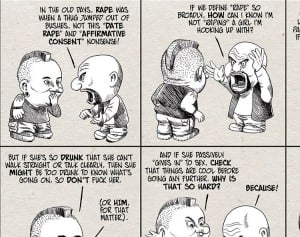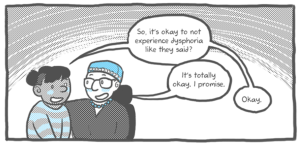
Person standing with arm on hip
Editor’s Note: We at Everyday Feminism would like to note that this is a United States specific post and that tentants’ laws vary by state. We encourage you to check out the laws where you live to make sure you know your rights.
In 2001 I went to law school evenings across the street from MacArthur Park, a space that also served as an open air market in central Los Angeles.
It wasn’t so much a park as an island of grass where kids went to score black market frogs and turtles, junkies picked up black tar heroin, and everyone scored I.D. cards. It was the hustle and bustle part of the city.
Above the law school, there were tap classes for kids. To this day, I can’t think about the process of briefing a case, Issue, Rule, Analysis, Conclusion without the sound of tip-tip-tapping in the back of my mind.
Below us was a tenant’s rights clinic, Inquilinos Unidos. I’d volunteer during the day and help tenants file complaints or request inspections.
Sometimes, the tenants were families that wandered over from the park, the voices asking about how much their landlord could raise the rent, pleading that their son or daughter had asthma and the roaches or roach treatment bothered their lungs.
These voices belonged to bodies. The voices had sturdy homes—walls of flesh and bone. The bodies they belonged to did not. The bodies were being pushed out, while new lighter-skinned, more privileged bodies were moving in.
We all know this is not a phenomenon that is just happening in this hustle and bustle part of L.A. People everywhere are being touched by gentrification and many are at a loss on how to combat this trend that catches on like wildfire.
Especially vulnerable are renters. According to 2016 US Census Bureau Survey over 37% of US households rent.
How many renters know their rights as tenants?
It’s can be hard to feel powerful and equipped when you’re running up against your landlord, but you do have rights. If you have any specific question about housing rights or need access to tenant’s rights organizations you can dial 2-1-1 or look up your local office here.
For now, here is a quick primer on 10 rights all tenants should know.
1. Your Residence Must Be Habitable
All tenants have a right to clean, habitable housing. It is the landlord’s obligation to maintain this standard.
Some examples are to ensure that doors and windows aren’t broken, roofs and walls keep out water, pipes deliver both hot and cold water, and that there are no vermin or pests.
Basically, all tenants have a right not to live in slum housing.
A slum is a heavily populated urban informal settlement characterized by substandard housing and squalor. While slums differ in size and other characteristics, most lack reliable sanitation services, a supply of clean water, reliable electricity, law enforcement and other basic services.
If you’re living in a place that is inhabitable, your first form of recourse is to make a verbal complaint to your landlord.
2. You Should Receive Timely Response to Complaints
If a rental is not inhabitable it is the landlord’s obligation to fix that immediately. Technically, they’re also forbidden from collecting rent during that time as well.
However, don’t take this as a green light to quit paying rent. Your best bet is to continue paying rent, so you have your end of the bargain documented. If things escalate to the point where the tenant needs to, they may recover the rent money they paid for the time the place was in disrepair.
This gives the tenant the upper hand, in the event that they have to sue, they will have everything well documented.
3. You Have A Right To Third Party Intervention If The Landlord Doesn’t Comply In A Timely Manner
When you’ve got a problem in your unit, the first thing to do is to notify your landlord verbally. If no action is taken write a dated letter detailing the issue. This letter should include photos with timestamps.
Worse-case scenario: the tenant can file a complaint with the Housing Authority and request an inspection.They could tell the landlord to fix the problem. Each city has a different form, for reference, here’s some information on how to initiate the process in L.A.
4. You Have The Right to Sue If Landlord Does Not Comply With The 60-Day Notice
If the problem does not get fixed after a 60-day notice has been issued to your landlord by the city it is time to sue to recover the rent you paid while living in an uninhabitable space.
This site can connect you with a local real estate attorney.
5. If Living In An Illegally Converted Unit, You Still Maintain These Rights and Protections
On Dec. 2, 2016, a friend called. His child was missing and he’d gotten news of a fire breaking out at a converted warehouse in Oakland called Ghostship.
The tragedy unsettled the core of the queer community. It seemed in 2016 we were all set aflame — in night clubs, at protests, and now in our converted living spaces.
In 2011, New York City began cracking down on converted living spaces after a fatal fire of illegally converted apartments in Queens. But, as rents rise people continue to get more creative with their space.
Still, the fact is: people living in and paying rent on illegally converted units still have the same protections any other tenants have.
However — and this goes for everyone — the best precaution is to write a check for your rent and put a note on the memo line “Rent for [Address].” Also, it’s good to try and get receipts each time.
This will help to confirm you are a rent-paying tenant and creates a paper trail for the time you are in the space should you ever need to go to court.
6. You Have The Right To Be Notified Before Your Landlord Enters The Residence
When can a landlord enter my unit? That seems to be the most common question I’ve heard over the years.
People often get notices that their landlord needs to come inspect but feel it may be a violation of their privacy. Some people have complained that the landlord has entered their apartment without their permission.
Unless it’s an emergency (which requires no notice) your landlord must give 24-hours notice.
This could be for a tour, repairs, or to let workers in. And, even with the notice, landlords are only supposed to enter during normal business hours.
7. Rent Increases Have Limitations
Rent controlled housing can only have rent increases once a year, and rent can only go up a certain percentage, which varies by city. Only certain states offer rent control, usually where there is a housing shortage.
Parts of California have rent control, as do New York, New Jersey, Maryland and Washington D.C. Generally speaking, rent control laws determine when, why and by how much a landlord can increase rent.
Even in places that have rent control, the laws only apply to certain buildings. For example, New York’s rent control laws only apply to buildings built before 1947 and require that the tenant has been living there continuously since before July 1, 1971.
Regardless of what a landlord could charge for rent on the open market, they can only raise the rent by a set percentage each time you renew your lease — no surprises.
Rent control laws generally require your landlord let you know at least 30 days in advance if they’re planning on increasing your rent when you renew.
If you live in a non-rent controlled unit and have a lease, your rent can’t be increased until the lease is up (unless the lease says otherwise).
But, unfortunately, if you have a non-rent-controlled unit and you rent month-to-month, as long as the landlord provides appropriate written notice then the rent can be increased anytime.
8. The Right To A Return On Security Deposits
Tenants are entitled to get their security deposit back within 21 days of vacating the unit. This is true nationally, however, the amount you get back can vary based on the condition of the unit.
For the amount that is withheld, the tenant should receive an itemized list explaining what was taken out of the security deposit and a dollar amount for each item on the list.
Also, if you live in a rent-controlled unit you are entitled to the interest on your deposit — not really likely to be much, but it’s something. Generally, the tenant is owed simple interest at the rate in effect when the security deposit interest payment is due.
If the deposit held is $1,000.00 and the applicable interest rate is 1.7%, then the interest payment due is $17.00. The security deposit interest rate is governed by city law, not the rent ordinance. This can vary but here is a state-by-state resource list.
9. Your Rights In The Event of An Eviction
If you live in a rent controlled apartment, there is a small set of specific reasons you could be evicted.
They are as follows: failure to pay rent, committing a nuisance, causing damage to the rental unit, creating an unreasonable interference with comfort or safety of other tenants, using or permitting the rental unit to be used for illegal purposes, and violating the lease.
Unfortunately, if you do not live in a rent-controlled apartment, you can be evicted for any reason at all.
A common misconception is that once you receive an eviction notice — either a 14-day or a 30-day depending on the reasons — if you don’t move out by the time stated in the notice, you can be thrown out of your apartment and evicted immediately. That is untrue.
Once the time in the notice to quit is up, it merely terminates your tenancy or the agreement/contract between you and the landlord. This allows the landlord to only begin the eviction process.
Fortunately for the tenant, the law has built in a reasonable amount of time for tenants to find a new place to live in the face of an imminent eviction – even if you have missed months of rental payments.
You also have other rights to potentially reduce the rent you owe. Keep in mind that the only person that can evict you is a Sheriff’s Deputy – your landlord has no right of possession in your apartment until then.
It’s a serious offense if he locks you out or forcibly removes you or your belongings himself.
On average, the eviction process usually takes around 5-6 weeks, but sometimes it can be even longer than that. Here’s a quick worst case scenario timeline:
- You’re served with a 14-day notice to quit for nonpayment of rent.
- Sometime after the 14 days, the landlord serves you with a summons and complaint for eviction.
- Once you receive the summons and complaint, a hearing is scheduled around 10 days after.
- If a judgment is made in favor of the landlord at the hearing, an execution will be issued 10 days after that.
- You’ll get a final 48-hour notice before the Sheriff’s Deputy comes to evict you.
So you see, even in the very worst case scenario you still have at least fourteen days. And it’s about five weeks if the landlord brings the eviction immediately and everything goes as scheduled — which is often not the case.
Remember, you can often extend that timeline and ask the landlord or the court for additional time if you need it.
***
In my experience, many matters can be resolved with a simple letter, but when in doubt it’s always best to seek support from housing advocates who are well versed on your legal rights and can cite the civil codes in your area.
Tenant’s unions across the country are organizing campaigns to improve the laws to support rent stabilization, just cause evictions, leads inspections, and to equip renters with a basic bill of rights.
If you are a concerned renter, contact your local tenants’ union and see how you can get involved.
There are a lot of online resources, too. There’s the U.S. Department of Housing and Urban Development and there are many websites for fair housing and tenant’s advocacy groups, such as the Housing Rights Center.
No matter what, always remember: Housing is a human right and you — in fact, every tenant — have a right to a safe, decent place to live.
[do_widget id=’text-101′]
Melissa Chadburn is an Everyday Feminism Reporting Fellow. Melissa has written for Guernica, Buzzfeed, Poets & Writers, Salon, American Public Media’s Marketplace, Al Jazeera America and dozens of other places. She is a fellow for The Economic Hardship Reporting Project. Her essay, “The Throwaways,” received notable mention in Best American Essays and Best American Nonrequired Reading. Her debut novel, A Tiny Upward Shove, is forthcoming with Farrar, Straus, and Giroux.
Search our 3000+ articles!
Read our articles about:
Our online racial justice training
Used by hundreds of universities, non-profits, and businesses.
Click to learn more




















